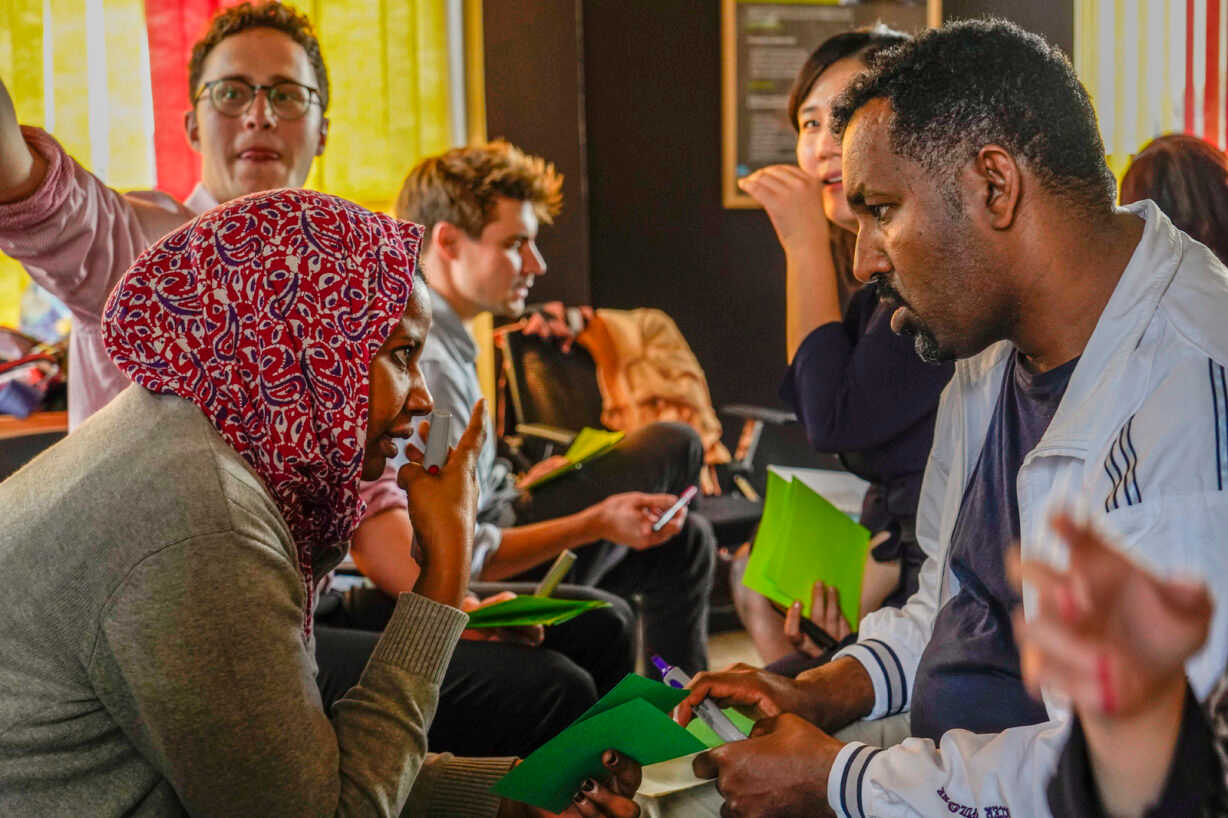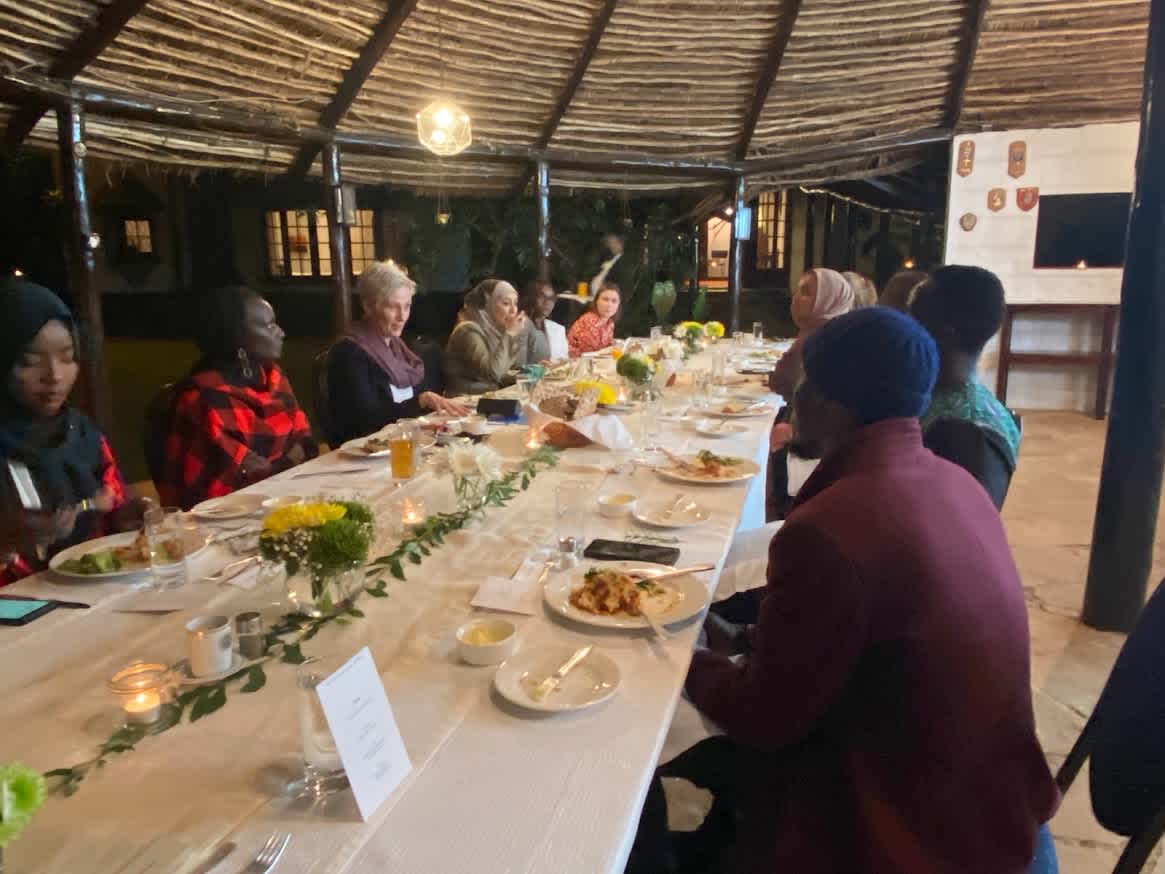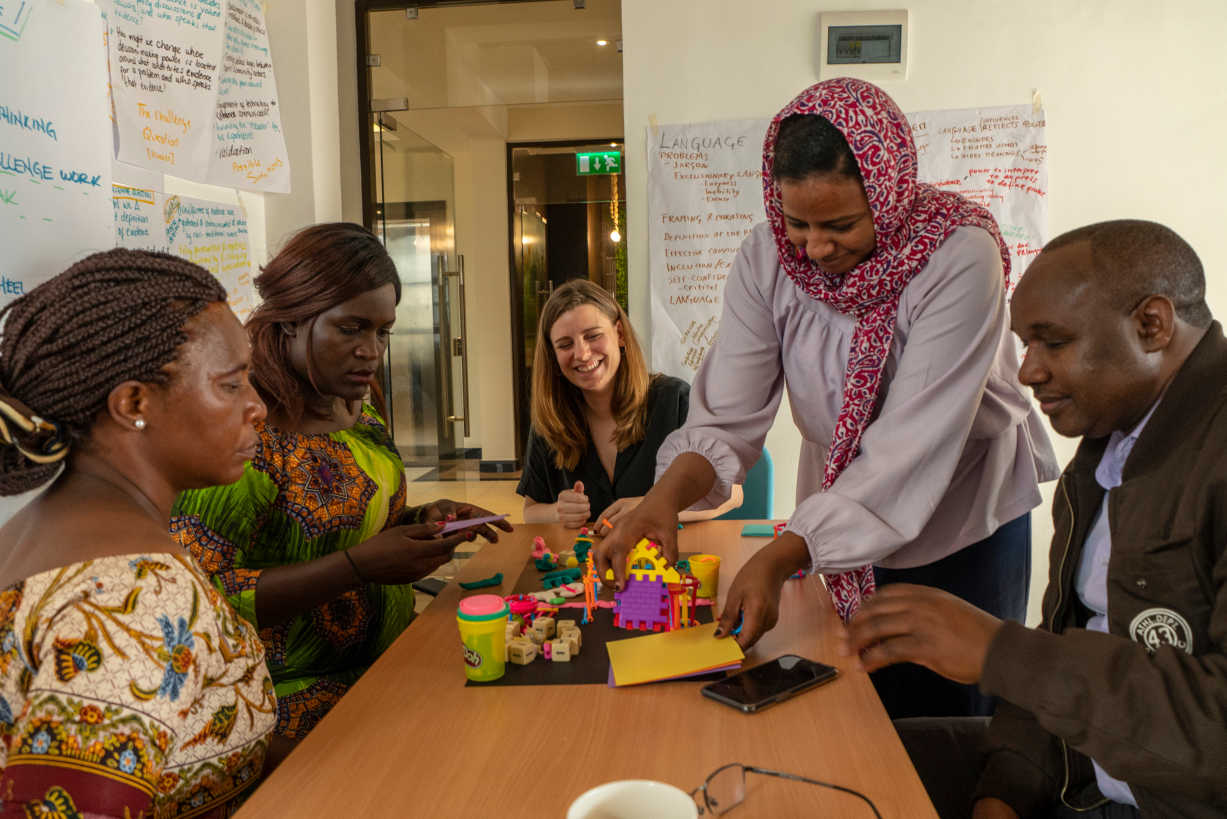Global
The Inclusive Peace in Practice Initiative
Initiated in 2020, the Inclusive Peace in Practice (IPIP) is a practice-to-policy initiative focused on developing, piloting, and learning how to advance more inclusive and meaningful policy engagement models. We believe that more meaningful and direct engagement between policy actors and the communities most impacted by various policies leads to better implementation and outcomes. From our work, we have learned that improved policy outcomes in communities result from strong relationships between policy actors and communities that are based on trust and cooperation and stem from more equitable engagements, regular communication, and feedback.
IPIP brings practice-to-policy through learning and insights developed from piloting new, more inclusive, and meaningful peacebuilding methodologies. We accompany our work with rigorous learning and research, community and policy actor co-design opportunities, and regular feedback and consultations. For example, in 2022, LPI’s Kenya Country Programme and IPIP implemented an innovative micro-grant for youth organisations working in informal settlements in Nairobi. In parallel, IPIP engaged a diverse group of donors and international non-governmental organisations on intermediary sub-granting and partnership. Integrating these processes led to shared learning across the peacebuilding and development communities, as well as direct opportunities for micro-grant recipients to engage with donors and policy actors.
Since its inception, IPIP has refined a power-aware engagement methodology that brings together local peace actors and community leaders with national, regional, and global policy actors. Typically, interactions between policy actors and local peacebuilders are rare, particularly international and regional actors with local peacebuilders. When these interactions do occur, they tend to be one-off meetings and tokenistic engagements, and they lack genuine conversation. In contrast, the IPIP methodology creates spaces that prioritise relationship building and genuine sharing and learning experiences that leverage the diverse knowledge and experiences that people bring to the table.
The spaces we create shun long monologues, ‘expert’ panellists, and one-way conversations. Instead, we carefully curate convenings that bring policy actors and local peacebuilders together in ways that foster collaboration and meaningful engagement towards action and shared purpose. In realising that we have shared goals, unique competencies, and are all part of the solution, we can develop stronger policies, implement them more effectively, and achieve greater outcomes for the communities we aim to serve.

Examples of our work
Quality Local Resourcing
In 2022, in partnership with our Kenya Country Programme, we provided flexible and demand-driven funding and support to seven youth-led organisations based in Nairobi’s informal settlement areas. Each community-based organisation (CBO) received a micro-grant of 150,000 Kenyan Shillings to implement three-month projects to contribute to social cohesion in the context of the 2022 Kenyan general elections. The grant model used a trust-based approach to give the CBOs ownership and control over their projects. Through this micro-grant, we incorporated a rigorous learning agenda about how donors and ‘intermediary’ organisations, like LPI, can design subgranting models and partner with local organisations in ways that more effectively lead to ownership and feelings of empowerment while delivering meaningful peacebuilding outputs and mitigating financial risks. In 2023, we are partnering with our Horn of Africa Regional Programme to pilot small grants in cross-border contexts.
As a practice-to-policy initiative, pilot initiatives like the 2022 micro-grant are combined with policy engagement strategies. For example, in November 2022, LPI and our partners, the Radical Flexibility Fund, convened an intimate event bringing together a deliberate and diverse group of organisations that included a mix of private donors, public donors, and international non-governmental organisations (INGOs) that are piloting and testing more accessible, equitable, and participatory models of resourcing. Through a small group setting and with guidance from an expert facilitator, the meeting was designed to build relationships that enabled genuine sharing, collaboration, and collective actions around local financing into the future.
Similarly, in June 2023 in Nairobi, we organised a ‘Knowledge Café’ event that brought together the CBOs we partnered with as part of the micro-grant initiative and representatives from the donor community and Kenyan and international INGOs. We designed the event to facilitate deep and nuanced conversations by carefully curating a group of participants and by facilitating equitable participation through which participants’ unique and shared experiences were valued and drawn on. The approach sparked rich conversations, fostered new connections, and allowed LPI to reflect on policy engagement strategies. Read more about our methodology in our blog about the ‘Knowledge Café’ here.
Somalia’s National Reconciliation Framework
Starting in 2021, in partnership with national non-governmental organisations in Somalia, LPI conducted issue identification workshops to determine opportunities for policy engagement on community-relevant topics. We used the innovative Power Analysis methodology to understand the power dynamics and openings to address community policy priorities. Through this process, the community-identified priority of reconciliation was connected with the ongoing National Reconciliation Framework policy process.
In 2023, LPI’s Somalia Country Programme and IPIP, in partnership with Somali Public Agenda, started a project to advance different Somali communities’ meaningful engagement in the completion and implementation of the National Reconciliation Framework. Supporting a network of Somali civil society organisations from across four regions of Somalia, the project creates opportunities for community-led engagements with policy actors at national and sub-national levels on how to advance reconciliation and transitional justice principles. Ultimately, the project aims to ensure community members and civil society are meaningfully engaged and have opportunities to provide leadership in Somalia’s reconciliation policy dialogues and implementation.
Swedish Ambassador and Kenya Youth Leader Engagement

As part of our efforts to provide local peacebuilding actors with increased access and meaningful engagements in policy spaces, we convened multiple meetings between the Swedish Ambassador to Kenya and youth leaders from across Kenya. These types of engagements between embassies and youth have significant power dynamics that are amplified with the presence of the ambassador. From IPIP’s convening and facilitation methodologies, we used techniques that amplify common understandings, break down pretence and formality, and enable genuine interactions and relationship building. As a result of these engagements, at the invitation of the youth leaders, the Ambassador visited informal settlement areas of Nairobi before the 2022 Kenyan elections to see and learn more about the youth organisations’ work directly.
UN Peacebuilding Architectural Review 2020 and 2023 Kenya Peacebuilding Architectural Review
In 2020, LPI was approached by the United Nations’ (UN) Peacebuilding Support Office (PBSO) in New York to host a regional consultation as part of the regional consultation element of the 2020 UN Peacebuilding Architecture Review (PBAR). In developing our approach, we saw an opportunity to bring together diverse stakeholders from the Horn of Africa and Great Lakes region, particularly community-based peacebuilding practitioners whose perspectives are often neglected from global policy processes.
Due to the COVID-19 pandemic, we used mixed virtual process that included two face-to-face consultations in Mogadishu (Somalia) and Bukavu (Democratic Republic of Congo), four virtual consultations with peacebuilding practitioners from borderland areas (Ethiopia, Uganda, Kenya, Sudan), and one virtual consultation with representatives of regional and international organisations. Despite the pivot to the virtual space, the consultations focused on democratising and innovating current policy engagement practices to be more inclusive spaces where all participants, independent of where they work, what language they speak, and how much they know about the technical, bureaucratic, and political intricacies of UN peacebuilding, would feel included and engaged in this global peacebuilding policy process.
As a result of LPI’s engagement in the UNPBAR, LPI was invited to support the Kenya Peacebuilding Architecture Review process led by an Independent Panel of Advisors. LPI provided early inputs to shape the methodology to be more inclusive and participatory. During the consultations, LPI organised consultations with peacebuilding and youth-community leaders using IPIP methodologies combined with exercises like participatory mapping and scenarios. Based on this support to the process, the UN Resident Coordinator in Kenya thanked LPI for contributing ‘to the inclusive nature of the process’.

Some of our partners
Radical Flexibility Fund: Radical Flexibility Fund (RFF) is working to improve the current foreign assistance and private foundation funding model to provide resources to individuals, networks, and civil society organisations more efficiently and effectively.
American University (Washington, DC): Working with Professor Susanna Campbell and the Research on International Policy Implementation Lab (RIPIL), LPI and RIPIL are designing innovative and inclusive research processes resulting in policy-relevant, community-driven academic research and evidence.
African Leadership Centre: The African Leadership Centre (ALC) was established in Kenya in 2010 as an educational trust under Kenyan law, and in partnership with King’s College London and the University of Nairobi to train a new generation of Africans and serve as a forum for transformative discourse on peace, security and development in Africa. Collaborating with ALC, LPI regularly hosts some of the African Leadership Fellows as part of LPI's work to connect academia with communities and policy actors.
Institute for Peace and Security Studies: The Institute for Peace and Security Studies (IPSS) at Addis Ababa University focuses on education, research and policy dialogues on peace and security in Africa. IPSS works to build the capacity of professionals on the continent through various education programmes and serves as the secretariat of the Tana High-Level Forum on Security in Africa. Together, we connect participatory and community-engaged research into policy forums at the African Union and across the region.
Somali Public Agenda: Somali Public Agenda is a non-partisan and non-profit public policy and administration research organisation based in Mogadishu. It aims to advance understanding and improvement of Somalia's public administration and public services through evidence-based research and analysis.
Related articles & resourcesKenya - Nairobi
LPI’s Kenya programme operates from our office in Nairobi, Kenya.
Postal Address
Life & Peace Institute, P.O. Box 64495-00620, Nairobi, Kenya
Visiting Address
AACC Compound, Waiyaki Way, Nairobi, Kenya
Phone +254 (0) 20 4440433
